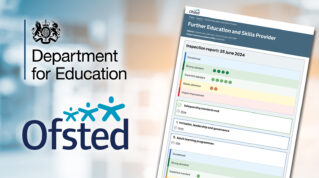Colleges will have to share their records and analysis of sexual abuse when Ofsted comes knocking in the future.
Inspectors will also speak to students about such issues after the watchdog admitted its inspections do not yet “sufficiently assess” the extent of sexual harassment in schools and colleges.
The new rules follow a rapid review ordered by the Department for Education in response to allegations of abuse shared on the Everyone’s Invited website.
Ofsted’s inspectors visited 30 schools and two colleges and spoke to over 900 young people in April and May about the prevalence of sexual harassment, finding that “many” teachers and leaders “consistently underestimate the scale of these problems”.
They “either didn’t identify sexual harassment and sexualised language as significant problems, they didn’t treat them seriously, or they were unaware they were happening”, according to the report.
The watchdog also reviewed the evidence bases for 93 inspections and found their own inspectors are failing to identify or follow-up on the issues.
It notes how schools have a requirement for leaders to provide records and analysis of sexual violence and sexual harassment, including online, but this is not currently in the FE and skills inspection handbook.
Ofsted has promised to amend this. “In future, on notification of college inspections, leaders will be asked to supply this information to inspectors. Inspectors will also be mandated to follow this up with college leaders,” today’s report said.
They also found that talking to single-sex groups of learners was an “effective way to gather evidence about sexual harassment and violence”.
As a result, Ofsted will “make it explicit” to inspectors they should do this during future inspections wherever possible.
“This will help inspectors to understand how a school’s or college’s approach to tackling sexual harassment and sexual violence, including online, is working”, the review added.
In addition, from September onwards, the inspectorate will “produce and jointly deliver further training on inspecting safeguarding in education settings, including looking at issues of peer-on-peer sexual abuse”.
Association of Colleges chief executive David Hughes responded positively to the new rules, insisting that colleges “want to do their bit to stamp out sexual abuse in our society”.
“Colleges work hard to create a safe environment for students to thrive in and will do whatever it takes to help eliminate sexual abuse and harassment. If that includes sharing data with Ofsted inspectors, then that is what they’ll do,” he said.
“We will support Ofsted to get the detail right on this – what is asked, how it’s used and how context is taken into account.”
Ofsted’s report warns that sexual harassment, including online sexual abuse, has become “normalised”.
Around nine in 10 of the girls that inspectors spoke to said sexist name calling and being sent unwanted explicit pictures or videos happened ‘a lot’ or ‘sometimes. Inspectors were also told that boys talk about whose ‘nudes’ they have and share them among themselves like a ‘collection game’, typically on platforms like WhatsApp or Snapchat.
Ofsted’s report does admit that the findings are “not fully representative” of schools or colleges across England, but says the issues are “so widespread that they need addressing for all children and young people”.
‘This review has shocked me’
Chief inspector Amanda Spielman said the review has “shocked me”.
“It’s alarming that many children and young people, particularly girls, feel they have to accept sexual harassment as part of growing up.
“This is a cultural issue; it’s about attitudes and behaviours becoming normalised, and schools and colleges can’t solve that by themselves. The government needs to look at online bullying and abuse, and the ease with which children can access pornography.”
In response, the Department for Education said that its upcoming Online Safety Bill will enshrine in law a “ground-breaking” new system of accountability and oversight of tech companies, where firms will need to “prevent children from accessing minimise inappropriate content, such as pornography and online bullying”.
The government also said it will encourage school and college leaders to dedicate inset day time to help train staff on how to deal with sexual abuse and harassment, and promised to introduce strengthened safeguarding guidance to boost teacher confidence in identifying and responding to these issues”.
Ofsted recommends that school and college leaders should “develop a culture where all kinds of sexual harassment are recognised and addressed, including with sanctions when appropriate”.















This is all fine and obviously really good to hear but to do this, Ofsted needs to put in place two things, both of which are related to each other. An inspector on each inspection who solely looks at safeguarding and nothing else, rather than trying to cram it in alongside judgements about 101 other things whilst adding more and more to the list of what inspectors have to try to cover in a very limited time, and for that inspector to be an expert on safeguarding, having received specialist training on how to approach sensitive issues such at this. Just slapping a few extra lines in the inspection handbook is most definitely not the answer.
I agree with Richard and would actually the safeguarding expert need to be expert in sexual exploitation of children and young people by their peers. The curriculum content also needs to be reviewed by the DFE to support the schools and colleges in the delivery of sex education that is relevant for the times we live in. Banning phones and other devices is not realistic and creates more barriers between the students and the teaching staff. Giving the students proper guidance on how to put in place security measures and where they can go for help and support should be the priority no an Ofsted judgement on a report. Whitewashing this issue will be a great mistake.
I agree with Richard and would actually say the safeguarding expert need to be expert in sexual exploitation of children and young people by their peers. The curriculum content also needs to be reviewed by the DFE to support the schools and colleges in the delivery of sex education that is relevant for the times we live in. Banning phones and other devices is not realistic and creates more barriers between the students and the teaching staff. Giving the students proper guidance on how to put in place security measures and where they can go for help and support should be the priority not an Ofsted judgement on a report. Whitewashing this issue will be a great mistake.
Another example of the need for OFSTED to develop different inspection requirements for different settings. A “one fit for all” framework is clearly inappropriate. If even the CQC inspection Framework recognises that a dental practice is different to a hospital which is different to a Care Home, then why cannot OFSTED see the blindingly obvious !